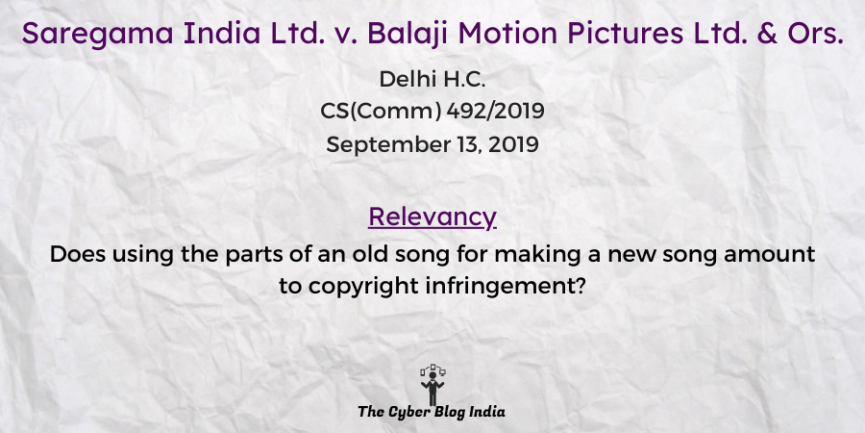Saregama India Ltd. v. Balaji Motion Pictures Ltd. & Ors.

Saregama India Ltd. v. Balaji Motion Pictures Ltd. & Ors.
(2019) 263 DLT 390 : (2019) 80 PTC 99
In the High Court of Delhi
CS(Comm) 492/2019
Before Justice Rajiv Sahai Endlaw
Decided on September 13, 2019
Relevancy of the Case: Does using the parts of an old song for making a new song amount to copyright infringement?
Statutes and Provisions Involved
- The Copyright Act, 1957 (Section 17(c), 55, 62)
- The Code of Civil Procedure, 1908 (Section 20(c))
Relevant Facts of the Case
- The plaintiff has filed this suit to restrain the defendants from exploiting the plaintiff’s copyrighted song in their soon-to-be-released film.
- For the first song, the plaintiff acquired the rights over sound recordings and musical and literary works from the film’s original producer. They received these rights in perpetuity.
- On August 27, 2019, the plaintiff learned about the defendant’s adoption of their original song in the said movie. The defendants did not seek permission from the plaintiff for this usage. They have recreated the new song by copying an integral part from the original song, also referred to as the hook part.
- The first defendant’s (Balaji Motion Pictures Limited) representatives had approached the plaintiff for licensing of the song. However, they stopped communicating after the plaintiff conveyed their terms and conditions. The second defendant in this case is ALT Digital Media Entertainment Limited.
- The third defendant (Zee Entertainment Enterprises Limited) has been paying the license fee for the original song for the last three years for broadcasting it on their channels under the orders of this court.
Prominent Arguments by the Advocates
The plaintiff’s counsel:
- The total duration of the new song is 129 seOf Out of this, 59 seconds of the song is the shat of the original song. The counsel placed reliance on the High Court’s judgement in Ram Sampath v. Rakesh Roshan (2008) to content that copying a part of a song amounts to copyright infringement.
- The email communication between the parties clearly demonstrates the defendants’ malafide intention.
The third defendant’s counsel:
- The plaintiff does not have the copyright over the original song. The ownership rights belong to Dada Kondke. His legal heirs had approached the Pune District Court for declaration and injunction under Section 62. The film featuring the original song is a subject matter of this suit. The District Court, in its order on July 05, 2017, had declared Mr. Kondke’s legal heirs to be the copyright owners.
- The 1979 agreement does not mention the name of the film that features the original song. Further, this agreement does not assign the copyright; it merely grants a license.
- The agreement specifies a term of 25 years. Even if it were to assign copyright, the agreement would lapse in 2004.
The first and second defendants’ counsel:
- This court does not have the territorial jurisdiction to entertain the suit. The ordinary place of business for the plaintiff is Kolkata and not Delhi.
- Except for two lines, the rest of the song that plays at the end of the movie is entirely different. At best, it is an example of adaptive and transformative work.
- The rights for the new movie have been assigned to the third defendant. Hence, only the third defendant is concerned with the rights claimed by the plaintiff.
Opinion of the Bench
- The defendants had replied to the plaintiff’s notice before filing of this suit. In this reply, they stated that the impugned song was not the same as that of the plaintiff’s song. They noted that it was a folk song. However, the defendants’ counsels did not raise this plea before the court. This clarifies that the plaintiff’s copyright infringement claim is not in dispute.
- The court noted the plaintiff’s submission that the judgement relied on by the first and second defendant’s counsel has been set aside by the Division Bench of the Calcutta High Court.
- The defendants’ claim of being unable to make last-minute changes is untrue. They chose to not argue the case on September 06, 2019, while the film was due to be released five days later.
- Strangely, the third defendant did not choose to approach the plaintiff while they were already paying royalty for the original song under this court’s orders.
- The court heard both the songs and concluded that the new song has the same catch line as the original song. This is sufficient to establish copyright infringement.
- There is no merit in the arguments related to the dispute on territorial jurisdiction.
Final Decision
- The court allowed the application and granted the injunction in the plaintiff’s favour. During the pendency of the suit, the defendants cannot exploit the plaintiff’s copyrighted works in any form whatsoever.
